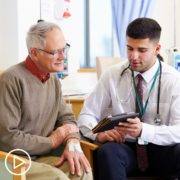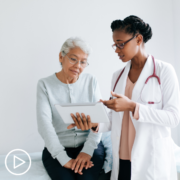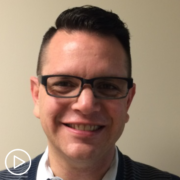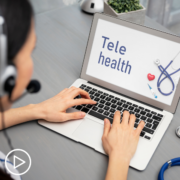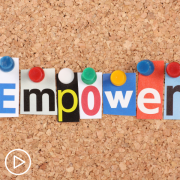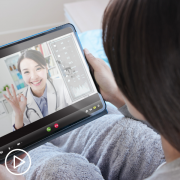How Can Myeloma HCPs and Nurses Help Manage Patient Concerns?
How Can Myeloma HCPs and Nurses Help Manage Patient Concerns? from Patient Empowerment Network on Vimeo.
How can myeloma care providers help in managing clinical trial concerns? Dr. Craig Cole from Karmanos Cancer Institute and advanced practice provider Charise Gleason discuss common concerns that they have encountered with patients and how they addressed the concerns.
Download Resource Guide | Descargar guía de recursos
Related Resources:
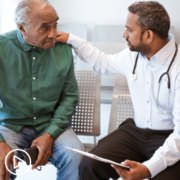
|

|
Transcript:
Dr. Nicole Rochester:
How do we mitigate and manage concerns despite all these wonderful things that both of you have shared? I’m sure that patients and family members have concerns about myeloma clinical trials. And so I’ll start with you, Ms. Gleason. And as you hear concerns from patients and families over the years possibly related to fear of randomization, fear of getting the placebo, you all have mentioned some uneasiness about adverse effects. How do you effectively mitigate and manage these concerns with patients and their family members and care partners?
Charise Gleason:
Yeah, you just have to continue to have open communication. And if you’re, if a patient is accustomed to you mentioning clinical trials, then when you present one to them, right? They’re a little more open to it. But not everybody starts with us. And we get referrals in midway and different parts and different paths along the way. But patients we do hear, “I don’t want to get a placebo.” Or you’ll mention a clinical trial and somebody will say, “Am I ready for hospice?” And it’s, you have to go back and start that education again that, no, you’re getting good treatment on this, a registry trial, for instance, you’re going to get standard of care treatment plus or minus something else, right? And so we really have to go back and educate that you are getting treatment. You’re going to be watched closer than any of our other patients actually.
You’ve got a whole team around you that’s talking about your trial and our patients every week. And so I think that our excitement and our being positive, we can get those patients to enroll on trials. I think something that makes me really happy is, we keep a list of every treatment line, and when you go through and it’s like standard of care, clinical trial, clinical trial, standard..it’s we’ve done the right thing then, right? Our patient has had full advantage of what’s available to them when we do that.
Dr. Nicole Rochester:
That’s wonderful. Thank you for sharing that.
What about you, Dr. Cole? Do you have anything to add with regard to managing the concerns that come up?
Dr. Craig Cole:
Yeah. The one thing that I tell patients, and I tell patients one-to-one, and when I do talks for some of the efficacy groups that I tell lots of patients that. That in 2024, myeloma trials are incredibly competitive. And the only, the best, best drugs, now float to the top as part of our clinical trial portfolio. There were days I remember begging companies for clinical trials saying, “Please, please think about myeloma.” And we were struggling.
Now, it is incredibly competitive, and that competition does a fantastic thing for patients because what we see in the clinical trial portfolio are drugs that are safer and safer and safer, and drugs that are more effective and more effective. When you go to these meetings and the expectation is that our response rate needs to be over 60 percent, then you know that the clinical trial mail you, that we work with them, is of a super high quality, which you really can’t say for a lot of other types of cancer.
So I tell patients that their fears that they have are absolutely justified. And one thing we teach the fellows, the residents and the medical students, is that you validate those concerns and you listen to those concerns and you don’t ignore it or blow through it. That you absolutely…those are the most important parts of that conversation. And if you don’t validate it, the patient says, “Well, I have a fear of randomization.” And you go, “Hmm, there’s no such thing.” Then that’s not validating. And that’s not even listening. That’s just moving on because you don’t have that concern, but you’re not bringing that, you’re not validating the patient’s concern. And so you have to be very, very careful in doing that because there are multiple studies that have shown those are the big concerns.
Also, bringing up the things that are facilitators for clinical trials, that if there is an opportunity for reimbursement for travel or reimbursement for hotel stays or reimbursement that we say that this trial has a reimbursement program, or if we say that use other things that help facilitate clinical trials like speaking to the family, not just speaking to a patient, but speaking to the caregiver and speaking to the extended family that that patient will have a conversation with are really important conversation because the more people that you can talk to, that’s part of that patient’s decision-making group, which can be very different from patient to patient based on their culture, the more likely you are to get a consensus among that decision-making group for the patient to go on a clinical trial.
Dr. Nicole Rochester:
Those are great tips

